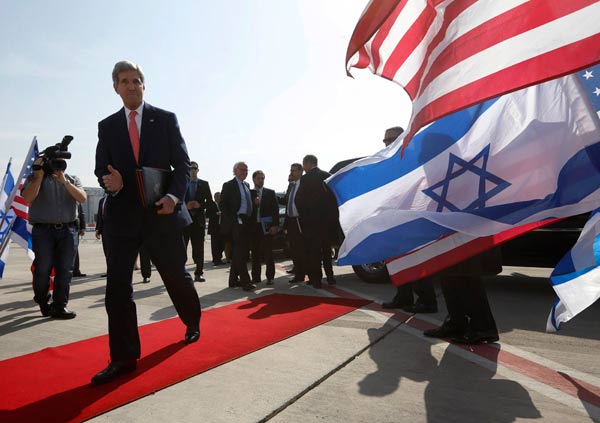Kerry says aims to close 'important gaps' in Iran nuclear talks
Updated: 2013-11-09 01:32
(Agencies)
|
|||||||||||
 |
|
US Secretary of State John Kerry walks to his plane after a private meeting with Israeli Prime Minister Benjamin Netanyahu in Tel Aviv November 8, 2013. [Photo/Agencies] |
GENEVA - US Secretary of State John Kerry said on Friday important gaps needed to be bridged in high-stakes talks with Iran on curbing its nuclear programme and he would meet Tehran's foreign minister shortly to try to clinch an interim deal.
"I want to emphasise there is not an agreement at this point," Kerry said shortly after arriving in Geneva, tempering rising anticipation of a breakthrough that would reduce the risk of a Middle East war over Iran's nuclear aspirations.
"We hope to try to narrow these differences but I don't think anybody should mistake there are some important gaps that have to be closed," he told reporters.
Midway through the second round of negotiations since Iran elected a moderate president who opened doors to a peaceful solution to the nuclear dispute, Kerry joined fellow big power foreign ministers in Geneva to help cement a preliminary accord, with Israel warning they were making an epic mistake.
Diplomats said a breakthrough remained uncertain and would in any case mark only the first step in a long, complex process towards a permanent resolution of international concerns that Iran may be seeking the means to build nuclear bombs.
But they said the arrival of Kerry, British Foreign Secretary William Hague and French and German foreign ministers Laurent Fabius and Guido Westerwelle signalled that the five permanent U.N. Security Council members and Germany may be closer to an elusive pact with Iran than ever before.
Kerry was expected to hold a trilateral meeting with European Union foreign policy chief Catherine Ashton and Iranian Foreign Minister Mohammad Javad Zarif.
A senior US State Department official said Kerry was committed to doing "anything he can" to overcome the chasm with the Islamic Republic. The powers aim to cap Iran's nuclear work to prevent any advance towards a nuclear weapons capability.
The top US diplomat arrived from Tel Aviv where he met Israeli Prime Minister Benjamin Netanyahu, who regards Iran's atomic aspirations as a menace to the Jewish state.
Netanyahu warned Kerry and his European counterparts that Iran would be getting "the deal of the century" if they carried out proposals to grant Tehran limited, temporary relief from sanctions in exchange for a partial suspension of, and pledge not to expand, its enrichment of uranium for nuclear fuel.
"Israel utterly rejects it and what I am saying is shared by many in the region, whether or not they express that publicly," Netanyahu told reporters.
"Israel is not obliged by this agreement and Israel will do everything it needs to do to defend itself and the security of its people," he said before meeting Kerry in Jerusalem.
Israel is not the only Middle East country fretting about Iran's nuclear ambitions. Saudi Arabia, Iran's chief rival for regional influence, has made clear to Washington that it does not like the signs of a possible US-Iran rapprochement.
Israel has repeatedly suggested that it might strike Iran if it did not shelve its entire nuclear programme and warned against allowing it to maintain what Israel sees as a nascent atomic bomb capability. Iran says its nuclear activities are geared only to civilian needs and has refused to suspend them.
The fact that an accord may finally be feasible after a decade of rhetorical feuding and hostility rather than genuine negotiations between Iran and the West highlighted a striking shift in Tehran's foreign policy since the election in June of Rouhani, a pragmatic former nuclear negotiator, as president.
In Iran, Iranian clerics voiced important support for the Iranian negotiating team. The Friday prayer leader in the town of Meshgin, Gholamreza Baveqar, was quoted by Fars news agency as saying that "the nuclear negotiators are sons of this nation and the Supreme Leader (Ali Khamenei) supports them."
Earlier this week Khamenei accorded crucial backing to Rouhani's negotiating track with the West, warning hardliners not to accuse him of caving in to old enemy America.
Related Stories
Kerry to join Iran nuclear talks in bid to reach deal 2013-11-08 09:28
World powers to consider sanction relief for Iran: US 2013-11-08 05:33
Iran calls for nuclear weapon elimination 2013-11-06 07:09
Iran urges to ditch pressure policy before nuke talks 2013-11-05 21:14
Iran says sanction relief to take time 2013-11-05 10:17
Iran 'not optimistic' on ongoing nuclear talks 2013-11-04 21:57
Today's Top News
CPC session begins to set reform agenda
Evergrande makes history
China's discipline agency targets holiday luxuries
Taxi driver is lone suspect in Taiyuan bomb blasts
German firms eye bigger role in China's progress
Huawei in steering board of European tech platform
Regulators draft bond guidelines
Chinese land reform at crucial stage
Hot Topics
Lunar probe , China growth forecasts, Emission rules get tougher, China seen through 'colored lens', International board,
Editor's Picks

|

|

|

|

|

|





